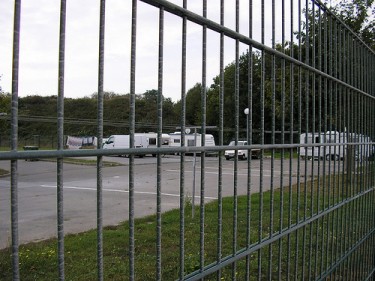In French politics, summer somnolence is usually a favorable time to pass painful reforms – retirement pensions for instance – or drastic budget cuts. Unfortunately, summer doesn't make social problems go on a hiatus. On July 18th, riots shook the quiet town of Saint Aignan in the Loire valley and immediately revived law-and -order reactions while also highlighting the discriminatory practices towards the itinerant community – referred to as “Gens du voyage” (Traveler People) in French.
Riots broke out in the town of 3,400 people after 22 year old Luigi Duquenet was shot and killed as he drove through a police checkpoint. Members of the itinerant community reacted to his death by attacking the local police station, hacking down trees, pillaging a bakery and eventually burning down cars. French President Nicolas Sarkozy called a meeting at the Elysée office to discuss the issue of the itinerant communities in France and “the problems created by their behaviour”. Sarkozy reaffirmed his “war against delinquents” stance and announced that itinerant people residing on illegal sites would be expelled.
A political argument?
Even in the Presidential political camp, the announcement was not unanimously approved. As reported by newspaper Le Monde [Fr], UMP Party Senator Pierre Hérisson, who wrote a report on the issue in 2008, fears that the “Saint-Aignan incident” might raise “confusion”. “What happened in Saint-Aignan is a matter of common law. It is not a problem related to the itinerant community”, he said, further reminding the public that in no way should the Roma community be considered as equivalent to the itinerant community. Although mentioned side by side in Nicolas Sarkozy's sentence, the two communities share neither the same history nor the same legal status, and are not in contact with one another. Stéphane Lévêque, director of the community organization Fédération nationale des associations solidaires d'action avec les Tsiganes et les gens du voyage (Fnasat) explains [Fr]:
“On one hand, you have the Roma people, who are foreign citizens of the European Union [mainly from Romania and Bulgaria], and on the other hand, the gens du voyage [traveler people], who are fully-fledged French citizens, and have been French for much longer than the Bretons and Savoyards”.
Bloggers’ outrage found support even in the moderate main media outlets. Jean-Pierre Dacheux emphasized this point by quoting Europe 1 radio station [Fr]:
Il y a des soirs où les faits parlent d'eux-mêmes. Même les médias “modérés” constatent l'outrance d'un gouvernement aux abois.
In a column on Rue89 online magazine, sociologist Laurent Mucchielli denounces [Fr] the exploitation of violence by the government. He concludes sarcastically:
Mais nous divaguons ! Il ne faut pas réfléchir, chercher les causes, diagnostiquer les contextes, s'informer d'abord auprès des acteurs locaux, nous risquerions de « donner des excuses aux délinquants » et de remettre en cause la croyance selon laquelle l'Etat et son premier représentant vont régler, une fois pour toutes, tous nos problèmes.
Stigmatization
Outrage erupted quickly as well elsewhere, from both concerned citizens and supporting organizations. Jean-Pierre Dacheux writes [Fr]:
“La France va mal, votre président va mal. Il cherche à détourner l'opinion publique vers des cibles faciles”, a déclaré Saimir Mile, porte-parole de la Voix des Roms. “Nous nous préparons à en prendre plein la gueule comme ça a toujours été le cas pendant les crises politiques mais cette fois-ci, encore un peu plus. La situation est très grave… La France ne veut pas des Roms.”
[…]
La réunion de mercredi prochain aura également pour objet de décider “des expulsions de tous les campements en situation irrégulière”, selon un communiqué de l'Elysée. Pour Coralie Guillot, de l'association Parada France, qui travaille avec les Roms de Seine-Saint-Denis, “ce n'est pas la peine qu'ils se réunissent car c'est déjà décidé: on n'a jamais vu autant d'évacuations en Ile-de-France que depuis deux ou trois mois”.
[a full report about shanty towns can be found here]
ZEC plus ultra stresses [Fr] that France was recently condemned by the European Committee of Social Rights of the Council of Europe for the housing conditions it offers to the Roma community. Beside quoting the main points of the decision (the entire decision can be found here), the blog provides links – including the Romeurope website – and a booklist to learn more about the Roma community.
Reading a report about the issue in a magazine, Feufol senses a trend of stigmatization and conflation that makes him uncomfortable [Fr]:
J'ai bien du mal à ne pas voir que derrière la mesure de façade que recouvre l'expression “certains parmi les gens du voyage” se cache une évidente stigmatisation de certaines catégories de la population qui n'a à mon sens pas sa place dans la bouche du chef de l'état.
Tolérerions-nous cette phrase si elle avait été prononcée à l'encontre, des juifs, des musulmans, des homosexuels, ou des bruns à lunettes ?
Il y a cet amalgame aussi qui me dérange, en ce qu'il semble désigner tous les nomades ; tsiganes, gitans, gens du cirque et ces Roms dont on connait mal les persécutions.
Et pourtant – et c'est peut être la principale raison de ma colère- je peine à trouver dans la presse les torrents d'indignation que ces propos devraient soulever.
I'm also uncomfortable with the conflation in his speech because it seems to identify all the itinerant communities: Zigans, Gypsies, circus artists, and Romas, whose persecutions are hardly known by the public.
And yet – and this is probably the main reason why I'm so upset – I'm hard pressed to find in the media the outpouring of outrage that those words should raise.
Aporismes is even more specific in his pointed criticism [Fr]:
En même temps, si ils portaient un signe distinctif, on pourrait les reconnaître ces roms. Ca permettrait de prévenir toutes leurs actions répréhensibles. Car c’est bien connu, ils ont ça dans le sang, c’est lié à leur race. Non ? Un petit signe. Pas une étoile, c’est connoté. Un tatouage ? Limite…
Vous trouvez qu’Aporismes exagère ? Que jamais dans ce pays cela pourrait arriver ?
Relisez cet article de Libération. Vous verrez qu’en France, en 2009, la gendarmerie n’a pas trouvé choquant pour un sou de marquer des Roms avec un tampon encreur. Histoire de faire un tri. C’est à ce genre d’actions, au fait que ses auteurs n’y voient vraiment rien à redire, même avec le recul que l’on peut mesurer à quel point Nicolas Sarkozy a instauré une république du mépris.
Or, du mépris à la haine, il n’y a qu’un pas.
You think I'm going too far with my cynicism ? You think that will never happen in this country?
Read again this report from Libération. You'll find that in 2009 in France, the National Gendarmerie was not shocked at all to mark Roma people with an inking-pad, just to sort them out. Even with the additional time-induced perspective, one realizes that it is because of these kind of deeds, in addition to the fact that the perpetrators seem to think there is nothing wrong going on, that one can get the measure of how much of a Republic of contempt Nicolas Sarkozy has established. As we know, there's a very thin line between contempt and hatred.
Meanwhile, the voices inside the itinerant communities themselves or from sympathizers remain temperate.
Blogger and on-line novelist Anna Galore writes [Fr]:
Dans cette malheureuse histoire autour du décès de Luigi, il y a plus que les faits et beaucoup moins qu'on ne peut en lire un peu partout. Tâchons déjà de n'incriminer ni les policiers, ni les Roms en général mais de chercher toujours plus à apprendre à mieux nous connaître pour vivre ensemble dans le respect mutuel.
dROMa blog gives a basic account of the facts [De] and links to the France Info radio station website for more comments from the community [Fr].
Human rights organization Ligue des Droits de l'Homme (LDH) concluded in its July 21 statement [fr]:
Les rapports officiels se succèdent pour dénoncer la situation des Roms et des Gens du voyage en France (CNCDH 2008, Halde 2009, Ecri /Commissaire aux droits de l'Homme du Conseil de l'Europe 2010…). Plutôt que d'en faire des boucs émissaires et d'exacerber les passions, le gouvernement se devrait de suivre enfin les recommandations qui lui sont faites pour affirmer l'égalité des droits.
[ If you know of Roma blogs in French, please contribute with links in the comments section]









1 comment
Interesting article, a bit academic but generally informative)) http://djanga.ru/2013/12/seine-776km/ There is something to ponder)) I look forward to continue))